Exam Experts
Here to provide you with the best verified exam material for you revision in your studies. Email at
for any kind of assistance.
- 1151
- 0
- 3
Community
- Followers
- Following
423 Reviews received
1154 items
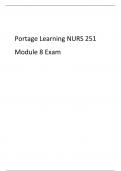
Portage Learning NURS 251 Module 8 Exam
Portage Learning NURS 251 Module 8 Exam.What is the general term used to describe medications that relieve pain? Your Answer: analgesics Analgesics Name the three main therapeutic effects of NSAIDs. Your Answer: arthritis, inflammation, joint pain Provide one example of a class of medication that is used to treat neuropathic pain. Your Answer: antidepressants
- Exam (elaborations)
- • 8 pages •
Portage Learning NURS 251 Module 8 Exam.What is the general term used to describe medications that relieve pain? Your Answer: analgesics Analgesics Name the three main therapeutic effects of NSAIDs. Your Answer: arthritis, inflammation, joint pain Provide one example of a class of medication that is used to treat neuropathic pain. Your Answer: antidepressants
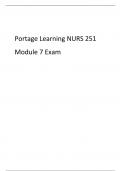
Portage Learning NURS 251 Module 7 Exam
Portage Learning NURS 251 Module 7 Exam.Name the cells responsible for the release of Hydrochloric acid in the stomach. Your Answer: parietal cells Describe the role of acetylcholine in the release of gastric acid. Your Answer: Acetlecholine binds to receptors, promoting the release of gastic acid. For example ach will bind to g cells to promote the secretion of gastic acid. Name the type of bacteria that is the primary cause of peptic ulcers. Your Answer: H. Pylori What does IBS stan...
- Exam (elaborations)
- • 9 pages •
Portage Learning NURS 251 Module 7 Exam.Name the cells responsible for the release of Hydrochloric acid in the stomach. Your Answer: parietal cells Describe the role of acetylcholine in the release of gastric acid. Your Answer: Acetlecholine binds to receptors, promoting the release of gastic acid. For example ach will bind to g cells to promote the secretion of gastic acid. Name the type of bacteria that is the primary cause of peptic ulcers. Your Answer: H. Pylori What does IBS stan...
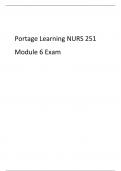
Portage Learning NURS 251 Module 6 Exam
Portage Learning NURS 251 Module 6 Exam.Antibiotics are a drug class with the ability to destroy or interfere with the development of what microorganism? Your Answer: bacteria Bacteria Label the following bacteria as gram-positive or Gram-negative (1 point each). a. Enterococcus Faecalis________________ b. Escherichia Coli______________________ c. Pseudomonas aeruginosa____________________ Your Answer: a. gram positive b. gram negative c. gram negative What is the term for an antib...
- Exam (elaborations)
- • 5 pages •
Portage Learning NURS 251 Module 6 Exam.Antibiotics are a drug class with the ability to destroy or interfere with the development of what microorganism? Your Answer: bacteria Bacteria Label the following bacteria as gram-positive or Gram-negative (1 point each). a. Enterococcus Faecalis________________ b. Escherichia Coli______________________ c. Pseudomonas aeruginosa____________________ Your Answer: a. gram positive b. gram negative c. gram negative What is the term for an antib...
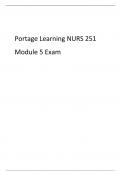
Portage Learning NURS 251 Module 5 Exam
Portage Learning NURS 251 Module 5 Exam.Name the microscopic sacs within the lungs that are the site where oxygen is exchanged for carbon dioxide. Your Answer: alveoli Alveoli What is the term that describes Leukotrienes? Your Answer: potent bronchoconstrictors Chemical mediators Describe the pathophysiology of asthma. Your Answer: Asthma is casued by the narrowing of the bronchioles from imflammation, mucus production, edema, and bronchospasms. It is recurrent and reversible. The ...
- Exam (elaborations)
- • 5 pages •
Portage Learning NURS 251 Module 5 Exam.Name the microscopic sacs within the lungs that are the site where oxygen is exchanged for carbon dioxide. Your Answer: alveoli Alveoli What is the term that describes Leukotrienes? Your Answer: potent bronchoconstrictors Chemical mediators Describe the pathophysiology of asthma. Your Answer: Asthma is casued by the narrowing of the bronchioles from imflammation, mucus production, edema, and bronchospasms. It is recurrent and reversible. The ...
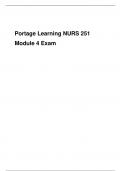
Portage Learning NURS 251 Module 4 Exam
Portage Learning NURS 251 Module 4 Exam.Which of the following endocrine glands is considered the “master gland?” -pineal, pituitary, thyroid, thymus, adrenal, pancreas, ovary or testis. Your Answer: pituitary Pituitary gland Describe the negative feedback mechanism of the endocrine system using the thyroid gland as an example. Your Answer: the pituitary gland releases thyroid stimulating hormone (TSH) which them stimulates the release of thyroid hormones (T4, T3, and calcitonin)...
- Exam (elaborations)
- • 4 pages •
Portage Learning NURS 251 Module 4 Exam.Which of the following endocrine glands is considered the “master gland?” -pineal, pituitary, thyroid, thymus, adrenal, pancreas, ovary or testis. Your Answer: pituitary Pituitary gland Describe the negative feedback mechanism of the endocrine system using the thyroid gland as an example. Your Answer: the pituitary gland releases thyroid stimulating hormone (TSH) which them stimulates the release of thyroid hormones (T4, T3, and calcitonin)...
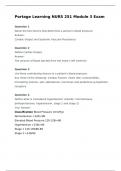
Portage Learning NURS 251 Module 3 Exam
Portage Learning NURS 251 Module 3 Exam. Question 1 Name the two factors that determine a person’s blood pressure. Answer: Cardiac Output and Systemic Vascular Resistance. Question 2 Define Cardiac Output. Answer: The amount of blood ejected from the heart’s left ventricle Question 3 List three contributing factors to a patient’s blood pressure. Any three of the following: Cardiac Factors- heart rate, contractibility, Circulating Volume- salt, aldosterone, hormones and peri...
- Exam (elaborations)
- • 9 pages •
Portage Learning NURS 251 Module 3 Exam. Question 1 Name the two factors that determine a person’s blood pressure. Answer: Cardiac Output and Systemic Vascular Resistance. Question 2 Define Cardiac Output. Answer: The amount of blood ejected from the heart’s left ventricle Question 3 List three contributing factors to a patient’s blood pressure. Any three of the following: Cardiac Factors- heart rate, contractibility, Circulating Volume- salt, aldosterone, hormones and peri...
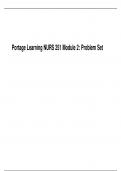
Portage Learning NURS 251 Module 2: Problem Set
Portage Learning NURS 251 Module 2: Problem Set.Define the following terms: Alternative medicine, complementary medicine, dietary supplement, and herbal medicine. Your Answer: Alternative medicine can be defined as herbal medicine, chiropractic, acupuncture, massage, reflexology, and any other therapies traditionally not emphasized in Western medical schools. Complementary medicine is defined as alternative medicine when used simultaneously with, rather than instead of, standard Western me...
- Exam (elaborations)
- • 12 pages •
Portage Learning NURS 251 Module 2: Problem Set.Define the following terms: Alternative medicine, complementary medicine, dietary supplement, and herbal medicine. Your Answer: Alternative medicine can be defined as herbal medicine, chiropractic, acupuncture, massage, reflexology, and any other therapies traditionally not emphasized in Western medical schools. Complementary medicine is defined as alternative medicine when used simultaneously with, rather than instead of, standard Western me...

Portage Learning CHEM 104 Module 6 Exam
Portage Learning CHEM 104 Module 6 Exam.Question 1 1. List the four main classes of biochemicals. 2. which are also called polypeptides are formed from monomer molecules. Your Answer: 1. Carbohydrates, proteins, lipids and nucleic acids 2. Proteins amino acid Question 2 1. The oxygen transport protein in blood is (name). 2. Globular proteins are in water. Your Answer: 1. hemoglobin 2. soluble Question 3 What are names of the four nucleoside bases found in RNA? Your Answer: adeni...
- Exam (elaborations)
- • 6 pages •
Portage Learning CHEM 104 Module 6 Exam.Question 1 1. List the four main classes of biochemicals. 2. which are also called polypeptides are formed from monomer molecules. Your Answer: 1. Carbohydrates, proteins, lipids and nucleic acids 2. Proteins amino acid Question 2 1. The oxygen transport protein in blood is (name). 2. Globular proteins are in water. Your Answer: 1. hemoglobin 2. soluble Question 3 What are names of the four nucleoside bases found in RNA? Your Answer: adeni...
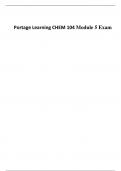
Portage Learning CHEM 104 Module 5 Exam
Portage Learning CHEM 104 Module 5 ExamQuestion 1 Hexene is a hydrocarbon containing (#) carbons and a (type) bond. Your Answer: 6 C=C double Question 2 The compound below is a type of hydrocarbon called a/an . Your Answer: aromatic hydrocarbon Question 3 The compound below is called (#s)-dimethyl . Your Answer: 1,4 cyclohexane
- Exam (elaborations)
- • 8 pages •
Portage Learning CHEM 104 Module 5 ExamQuestion 1 Hexene is a hydrocarbon containing (#) carbons and a (type) bond. Your Answer: 6 C=C double Question 2 The compound below is a type of hydrocarbon called a/an . Your Answer: aromatic hydrocarbon Question 3 The compound below is called (#s)-dimethyl . Your Answer: 1,4 cyclohexane
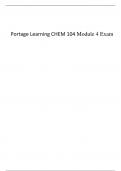
Portage Learning CHEM 104 Module 4 Exam
Portage Learning CHEM 104 Module 4 Exam.Question 1 For the cell described by the following cell diagram. Cr (s) | Cr+3 (aq, 1 M) || Al+3 (aq, 1 M) | Al (s) Al+3 + 3e- → Al E0 = - 1.66 v Cr+3 + 3e- → Cr E0 = - 0.73 v (1) The anode half reaction is (2) The cathode half reaction is (3) The overall cell reaction is (4) Show the calculation for the total cell potential (5) State and explain whether the cell is voltaic or electrolytic Your Answer: 1) Cr (s) → Cr+3 (aq) + 3e- 2) Al+3 ...
- Exam (elaborations)
- • 11 pages •
Portage Learning CHEM 104 Module 4 Exam.Question 1 For the cell described by the following cell diagram. Cr (s) | Cr+3 (aq, 1 M) || Al+3 (aq, 1 M) | Al (s) Al+3 + 3e- → Al E0 = - 1.66 v Cr+3 + 3e- → Cr E0 = - 0.73 v (1) The anode half reaction is (2) The cathode half reaction is (3) The overall cell reaction is (4) Show the calculation for the total cell potential (5) State and explain whether the cell is voltaic or electrolytic Your Answer: 1) Cr (s) → Cr+3 (aq) + 3e- 2) Al+3 ...

PORTAGE LEARNING BIOD 151 MODULE 1 – 7 EXAMS A&P 1.
ATI Renal / Urinary Exam 2023.
PORTAGE LEARNING CHEM 210 TEST 8.
HESI EXIT EXAM 1(Questions And Answers)
PORTAGE LEARNING BIOD 151 MODULE 1 – 7 EXAMS A&P 1.